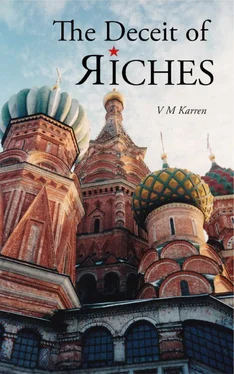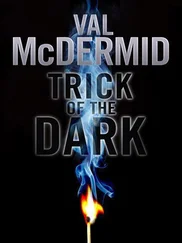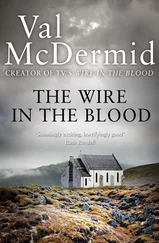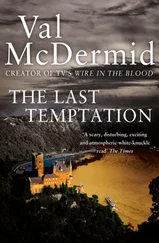“Excuse me, please?” I turned and addressed an older woman leaving the park. “Can you tell me please where Park Kulibin is?”
“Further that way on the other side of the street,” She was motioning further up the street in the direction I had already been walking.
“And do you know if there is a little white church in that park?” I queried.
“Yes! Two of them!” and with that she put her head down and trudged on, towing her small dog behind her on a leash.
After fifteen minutes more I came to what turned out to be to Park Kulibin. To my relief, both white churches were visible through the naked birch groves as their spires poked above the tree lines. It was rather obvious which was the smaller one. I had still an hour to wait. I found a small café in the middle of the park and waited. As I sat and nursed a wretched, over-bitter mug of cacao. I couldn’t imagine why there had to be so much melodrama around meeting Misha. What an odd character he was. His demeanor and commands on the telephone reminded me of Yulia’s paranoid attitude toward talking on the telephone. I thought back to Olya’s revelation that the telephones are all bugged and everybody was still listened to by the secret police. It was no wonder that nobody wanted to speak more than needed over the telephone, but certainly people could be more polite about it!
At four o’clock sharp Misha appeared from the woods in front of the chapel and approached me directly and asked, “Are you Pytor?”
Without answering his question directly, I asked back “Are you Misha?”
With my question, he thrust his hand forward to shake hands with me, “Come, let’s walk this way,” and he led me deeper into the park away from the encircling streets.
Mikhail, or Misha, was a nondescript man of average height, average weight, dark hair and dark eyes with a light beard and was in his late twenties or early thirties. He dressed in gray. He would match any police description except that of a tall bald mafia enforcer with gold teeth. He wore wire rimmed spectacles. He wasn’t bold, but neither was he a mouse of a man. He walked with purpose.
“Why all the cloak and dagger?” I asked him with a bit of relief in my voice.
“Del’s business is always under investigation from one police or tax inspector or another. I never discuss on the telephone about where I am or will be. This is to keep Del’s paperwork and records safe. Otherwise, the next thing you know the place has been burgled. It’s happened twice since I started working for Del only one year ago,” Misha explained.
“What are the investigations for?” I queried.
“Jealousy, espionage, trying to steal his information in order to steal the business plans. So, when you call me, we will always meet in a new place to discuss our assignments, but never in my home or my office. We’ve had so many setbacks in one year that we can’t take any risks,” he apologized.
“What about Del’s place? He doesn’t seem too concerned,” I pointed out.
“No, that’s because that is his official home and those working in the shadows would never risk attacking his home because he is in the good circle with the mayor, you know? To be that brazen would mean that Del would have reason to close up shop and leave, which nobody wants because of the foreign investment he represents. So, the word is out that nobody can touch Del in his home. They try backhanded ways that don’t look overtly suspicious,” Misha talked as quickly as he walked.
“So why not just keep everything in Del’s apartment?” I thought I was asking an obvious question.
“That’s like leaving honey for the bear! It’s too tempting. Sooner or later when there is a frustration, somebody will go take everything and bump off Del, literally or figuratively, so we keep things moving around so Del can’t be forced out of the project,” Misha seemed to know what he was up against.
We walked further into the park and eventually right out the other side and we crossed Gorkiy street and straight down Osharskaya street. I was following Misha thinking that we were heading to his office or apartment for a briefing and to give me a list of apartments to visit and view.
“So, I am supposed to be inspecting apartments that Del is going to rent. Are there already any apartments to visit?” I asked my guide.
“Yes, we have had seven people interested to rent or sell their apartments to us, but because we aren’t sure of the ownership of the apartments at this point, we will only visit those for rent. If in the end we get thrown out of these places by the rightful or new owners, then we haven’t lost any real money. Do you understand?” It seemed Misha had thought the whole thing through and was ready for any contingency.
“Yes, of course. Seems wise to me,” I stammered trying not to seem to clueless.
“So, do you have time right now to go and view the apartments?” he asked me abruptly.
“Sure, but don’t we have to make an appointment?” I said trying to stall due to my unsettled nerves.
“No, these people are so eager to rent the places we could arrive at ten o’clock tonight and they would serve us tea and take us on a grand tour,” Misha said with some arrogance.
“I have no further appointments tonight, so let’s go,” I said trying to muster up my courage.
“Very good, then. We’re there!” Misha stopped walking and pointed upwards.
I stopped and looked around me to see a small park on our right boxed in on three sides by a mix of squat three story buildings from the turn of the century in bold colors in a folk architecture style. On the left was a well-kept apartment building from the 1960s with some interesting modern architectural elements. The standard block apartment buildings were nowhere to be seen. These apartments were obviously built for the intelligentsia of the city, not the working class. With the offices of the Atomic Energy Project around the corner on Svoboda Square, it was obvious that these apartments were a grade above what I was living in, meant for people a grade higher than who I was living with. It was a constant surprise to me to find these types of hidden, pleasant squares and nooks in the city. Here is where the city’s middle class lived. I could imagine nuclear engineers and professors wandering around the memorial gardens dreaming about solutions to complex equations and reactions, and reading Tolstoy and Pasternak on weekends in the shade while enjoying a smoke from a pipe with a cravat around their throats.
Before we entered the five-story red and white brick building Misha stopped me to give me some instructions.
“It would be very wise if you didn’t say anything while we are viewing the apartments. Just take mental notes, write some things down if you want to. I don’t know how people might respond to a foreigner asking questions,” his face was cold and serious.
“OK, I will just smile and be polite,” I nodded and pinched my lips closed with my thumb and index finger.
“Very good!” he was happy to be obeyed.
We rode the lift to the fifth and top floor in a narrow cabin lined with wood with a wrought iron grate protecting us from falling out as we passed upwards through each floor; thick concrete slabs and rebar. The cabin jolted to a halt on the fifth floor and Misha threw open the grating for us to step out onto the landing, a door on either side of us: numbers 51 and 52. On most floors of a workers’ building there could be four or six different doors with small two room apartments behind each door. Standing on the landing these apartments promised to be large and spacious. Misha rang the bell at number 52.
Misha whispered to me as we waited for the door to open. “Del wants all the apartments to be at least five floors up, for security. We’ll have to put steel doors on these as well, for security.”
Читать дальше












